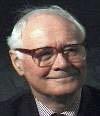Purpose and the Cosmic ConclusionOne final threat to any claim that the universe is designed, as the expression of a divine purpose, needs to be considered. In a sense, it is the ultimate difficulty, for it concerns how things will end. As cosmologists peer into the universe’s future, they tell us that the only honest answer is “badly”. There are the two possible alternative scenarios of collapse or decay, but either way carbon-based life will prove to have been a transient cosmic episode, and eventually all is condemned to futility. We know about built-in obsolescence in car design, but surely Creatorly design should be able to do better than that? Can one wonder that Steven Weinberg notoriously said that the more he understood the universe, the more it seemed pointless to him? We have to consider what response theology can make to this. I do not think that the problem posed by cosmic death on a time-scale of tens of billions of years is altogether different from the problem posed by the even more certain knowledge of our own deaths on a time-scale of tens of years. In each case, what seems to be put in question is the genuineness of the Creator’s concern for creatures. Do they - do we - matter to God only transiently? Those of us who believe in the steadfast faithfulness of God must reply that creatures matter to God for ever. What cosmic and human death remind us of is that an evolutionary optimism, based on total fulfillment in terms of unfolding present process, is an illusion. Death is a real end, but it is not the ultimate end, because only God is ultimate. As a Christian speaking in this season of Easter, I affirm my belief in a destiny beyond death. Such a destiny could never arise naturally but it can only be the outcome of a great divine redeeming act. To trust that that is God’s ultimate purpose is an exciting and mysterious belief, that I cannot find time to explain and defend on this occasion, though I have sought to do so in some of my writings (The Faith of a Physicist). I agree with Steve that the issue of apparent cosmic futility is one of paramount importance. In reality, it is the question of whether the universe makes total sense or not. We disagree about the answer to that. Such disagreement is possible because, as I have repeatedly acknowledged in this talk, none of us has access to logical certainty in metaphysical matters. What I have sought to show in this talk is that religious believers who see a divine Mind and Purpose behind the universe, are not shutting their eyes and irrationally believing impossible things. We have reasons for our beliefs. They have come to us through that search for motivated understanding that is so congenial to the scientist. That search, however, needs to be pursued in the widest possible context, including the insights of science but going beyond them, in the direction of the deepest and most comprehensive encounter with reality.
Contributed by: Sir John Polkinghorne |





